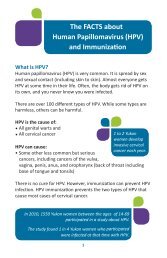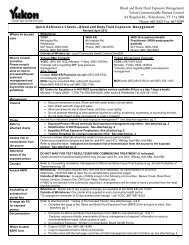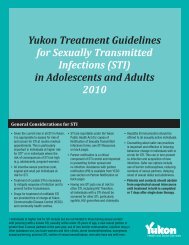Principles of Immunology - Health and Social Services
Principles of Immunology - Health and Social Services
Principles of Immunology - Health and Social Services
Create successful ePaper yourself
Turn your PDF publications into a flip-book with our unique Google optimized e-Paper software.
Community Nursing<br />
Yukon Immunization Program<br />
Section 14 - <strong>Principles</strong> <strong>of</strong> <strong>Immunology</strong><br />
2011 March<br />
Page 10<br />
2) Opsonization:<br />
Encapsulated bacteria (e.g., Hib, pnemococcal, <strong>and</strong> meningococcal) evade the<br />
innate immune system because they are not recognized by macrophages or<br />
dendritic cells. However, encapsulated bacteria can be recognized by<br />
antibodies. The antibody coats the bacteria to enable the ingestion by<br />
macrophages <strong>and</strong> dendritic cells through the process <strong>of</strong> opsonization.<br />
3) Complement Activation:<br />
Antibodies bind to certain bacteria in the plasma. A region on the antibody is a<br />
receptor to complement proteins which will help lyse the bacteria or attract the<br />
macrophages to it.<br />
Figure 6 - Antibody Function<br />
Figure 6: ©2007 From Janeway’s Immunobiology, 6E by Murphy et al.<br />
Reproduced by permission <strong>of</strong> Garl<strong>and</strong> Science/Taylor & Francis, LLC.




![Women and Alcohol: A women's health resource [2326.26 KB ]](https://img.yumpu.com/22340649/1/190x245/women-and-alcohol-a-womens-health-resource-232626-kb-.jpg?quality=85)











